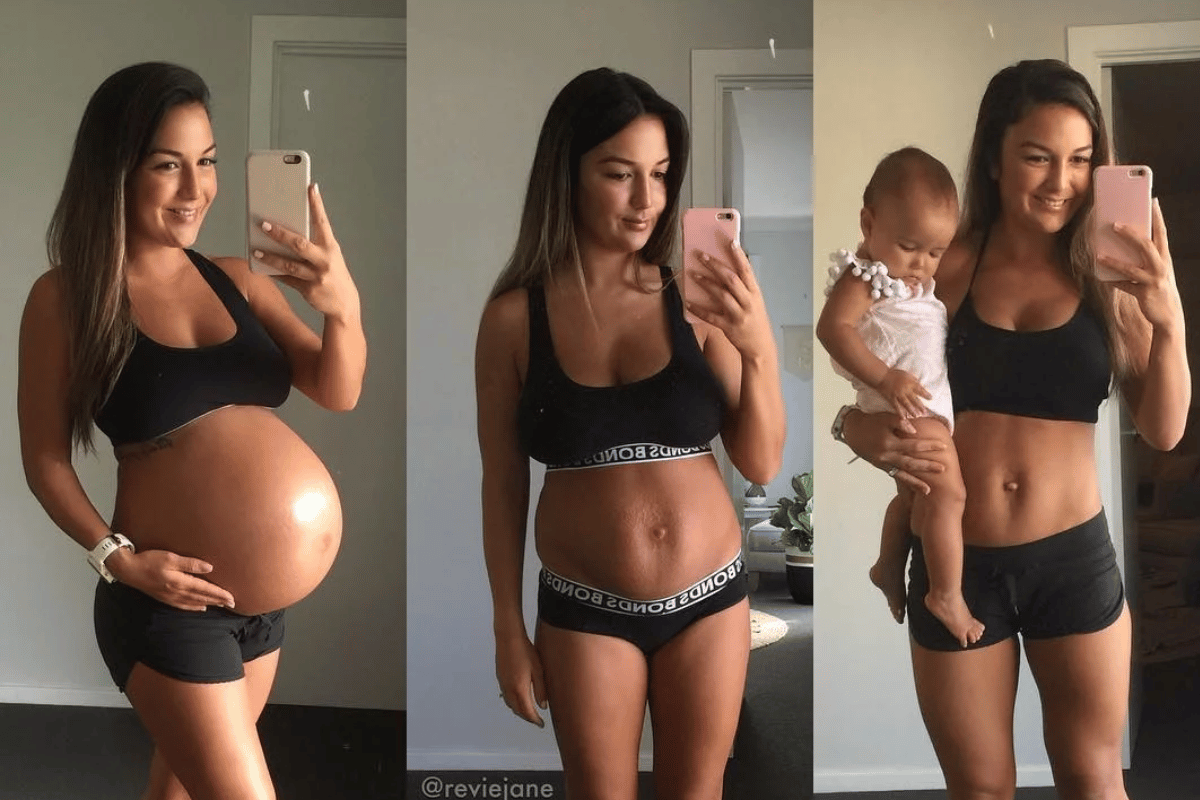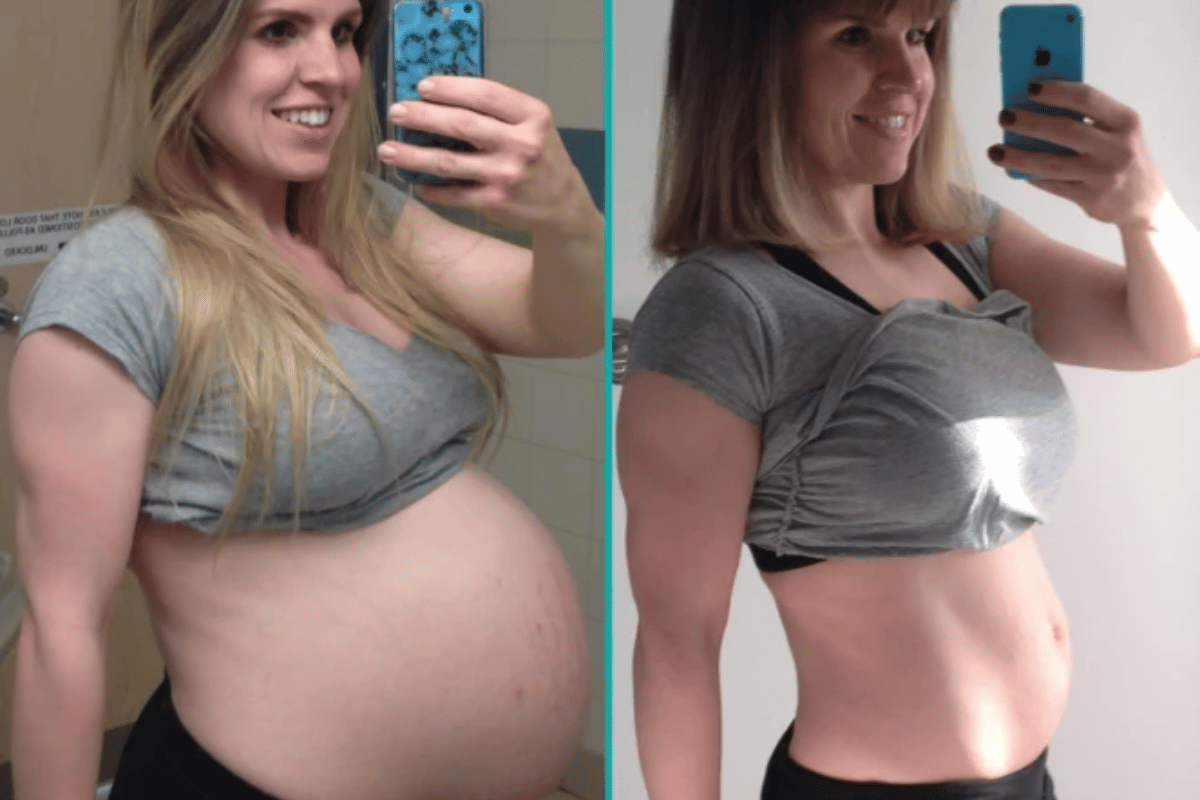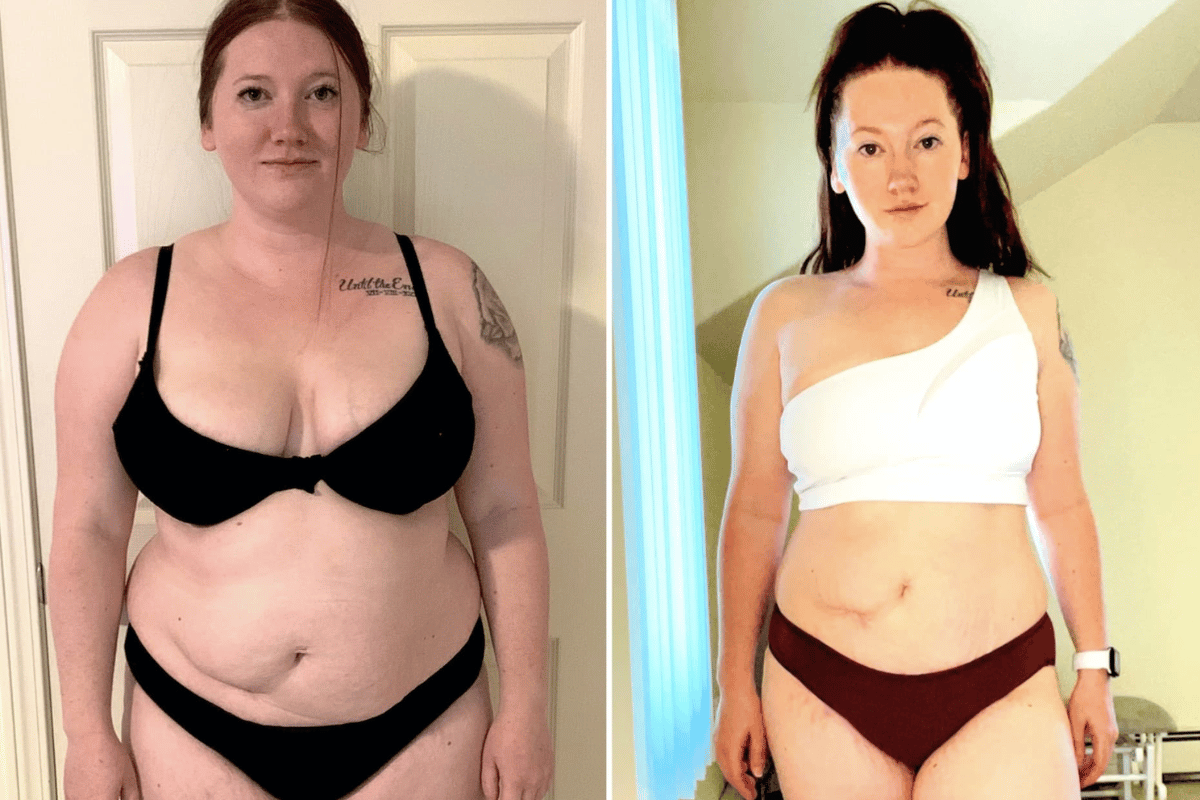It is of great significance for the new mothers to lose weight after parturitition. On the one hand, postpartum weight loss can improve the body and mind of the moms , which brings better energy and trust in themselves to deal with the subsequent maternal mission. On the other hand, if the extra weight can be reduced in time, it can avoid a lot of partudem complications such as gestational diabetes, high bood pressure and obesity, which has great influence on the lifelong health of the mother.
Since, new mothers usually face various challenges whilst trying to lose weight. It’s usually hard for them to loose weight due to breast feeding and also new mumhens lose weight because of their depression and their babies lack of sleep. On the top of these, first six months after having the baby, when hormones are on completely different level. This means mother’s body is not ready to loose weight.
During the post pregnancy, it seems difficult sometimes for mother to staying away from their coffee, desserts and candies and do exercises for daily. Because these things make them feel comfortable, especially after their breakfast and often after the dinner.
Therefor, new moms should start looking for the ast best ways to loosing weight without any exercise in their home. This will help them better go back to their own weight after pregnancy and will help them to increase their mental and physical health.

Overview of Non-Exercise Weight Loss Methods
You might wonder how this is possible. Trying to lose weight in these ways might seem counterintuitive. But there’s actually substantial evidence that weight loss without exercise, especially for postpartum women, can very much be a useful part of a healthy lifestyle. Dietary and lifestyle changes can promote weight loss and improved health without the necessity of gruelling exercise programmes.
One of the simplest benefits of NWT is the fact that they are easy to carry out. A new mum will not have the luxury of being able to exercise after giving birth, because she is busy with all the baby care that is needed in the first year. But if she focuses on a healthier diet, drinks more water, has more sleep, and manages stress better, she can lose the weight without having to fit exercise into her busy schedule.
Furthermore, these strategies can foster sustainable weight loss by building healthy habits. Those can be more easily maintained over the long-term, therefore the work isn’t only about size loss, but size wellness – an integral part to new mothers getting used to their new reality.

Step 1: Focus on a Healthy Diet
Nutrient-Rich Foods
A healthy diet is the backbone of weight loss for postpartum women. By consuming whole, nutrient-dense foods, you can begin to repair your body and fully recover by receiving the right amount of vitamins and minerals and energising your body after birth. Nutrient-dense foods usually have fewer calories but more nutrients – which is exactly what your body needs to function at its best.
Examples of nutrient-rich foods include:
Leafy greens like spinach and kale
Fresh fruits such as berries, apples, and oranges
Lean proteins like chicken, fish, and tofu
Whole grains such as quinoa, brown rice, and oats
Healthy fats found in avocados, nuts, and seeds
Balanced Meals
Make sure the meal is balanced when trying to lose weight. If a packed meal consisting of the right amounts of proteins, carbohydrates, and fats is consumed, you will not immediately feel hungry again, which is the outcome you want since it aids in losing weight. If you eat the correct portions of food, you have a better chance of maintaining the correct weight.
Here are some tips for balanced meals:
Fill half your plate with vegetables and fruits.
Include a portion of lean protein with every meal.
Choose whole grains over refined grains.
Add a small amount of healthy fats to your meals.
Pay attention to portion sizes to avoid overeating.
Following a nutrition-packed diet and meals in appropriate and suitable amounts, while avoiding any physical exercise, would be consider to protect the balance of weight, which aids in retaining and losing weight. Furthermore, it accelerates recovery and well-being postpartum.
Step 2: Hydration is Key
Benefits of Staying Hydrated
There is nothing more important for losing weight and keeping the body healthy with hydration! Due to unusual water absorption, dedicated water is a common problem for most women after confinement. Most nutritionists believe that if you drink enough water, it can speed up metabolism help your body get rid of toxins, water will also become a good appetite suppressant. In addition recommond drinking enough water will make our digestion well, after that we do not want to eat more, because thin people will always feel like full after drinking 2 glasses of water. So most people mistake thirst as hunger.
It is recommended that you drink at least eight 8-ounce glasses of water per day to meet your daily intake either way. If you are a postpartum mum, especially if you are breastfeeding, you will need to keep drinking even more in order to maintain hydration.
Hydration Tips
To increase water consumption and maintain proper hydration levels, consider the following practical tips:
Carry a reusable water bottle with you and take small sips throughout the day.
Set reminders on your phone to drink water regularly.
Start your day with a glass of water to kickstart your hydration.
For being such a vital substance, water is disappointingly banal. It’s no wonder it’s so hard to keep drinking it: we compensate for the dull sensation it actually gives us by selling it in colourful plastic bottles in fancy flavours, or by adding lemon, cucumber and mint to the stuff that comes out of taps.
Include hydrating foods in your diet, such as watermelon, cucumbers, and oranges.
If straight water is not appealing to you, herbal teas are a good way to stay hydrated and enjoy the extra health aids without additional sugars and/or calories. Green tea contains a metabolism-booster, which may help people lose weight.
However, staying hydrated after childbirth can help postpartum women increase their rate of weight loss, and feel healthier and happier all around.
Step 3: Prioritize Sleep and Rest
The Role of Sleep in Weight Loss
Weight management matters a lot to my postpartum patients – inadequate sleep can derail you. It totally crashes your metabolism. You’re more likely to develop a pre-diabetic condition. You get hungrier; when you’re sleep-deprived, you have more ghrelin (the hunger hormone) and less leptin (the hormone that tells you you’re full). You feel hungrier and crave high-calorie foods, and then impatience takes over and you give in.
Improving Sleep Quality
To enhance sleep quality and support weight loss, consider the following tips:
Keep a regular sleep schedule by going to bed and waking up at the same time each day, even on weekends.
Create a restful sleeping environment by keeping your bedroom cool, dark, and quiet.
Avoid caffeine and heavy meals close to bedtime, as they can disrupt sleep.
Cut back on screen time before sleep – tablets and phones emit blue light that blocks the pineal gland’s ability to produce melatonin.
Practice some relaxation techniques, such as reading, listening to relaxing music or doing some deep breathing, to help you wind down for bed.
This in turn will help her sleep and rest, boost her metabolic function and minimise cravings. Quality sleep was part of the some of the best ways to lose weight without exercise, and ideally should be part of any weight loss programme.

Step 4: Mindful Eating Practices
Understanding Mindful Eating
The simple trick to losing weight is mindful eating. This is what it means to become aware of eating, and to eat more slowly, really savouring your food and listening to your body so that you stop when you’re satisfied and fully absorbed in your experience. You’ll find that this helps you not to overeat, and you can sense when you’re hungry or satisfied.
Benefits of mindful eating for weight loss include:
Reduced calorie intake by avoiding mindless snacking
Improved digestion due to slower eating pace
Greater satisfaction from meals, reducing the urge to overeat
Avoiding Emotional Eating
One of the main issues with postpartum women is emotional eating, meaning eating when one is not actually hungry – often eating in response to other feelings.This is followed by a paraphrased version of the input while retaining the original citations and quotes: Emotional eating, or eating in response to feelings rather than hunger, is a well-known problem among people of all backgrounds. Often, stress, exhaustion and hormonal shifts can precipitate an emotional eating episode, as a coping mechanism to deal with our feelings.
To combat emotional eating, consider these strategies:
Identify your emotional eating triggers, such as stress, boredom, or sadness.
If a thought becomes emotionally distressing, find alternative ways to cope with emotions: call a friend, take a walk, or use relaxation techniques.
Keep a food diary of everything you eat and how you feel about it. This can help you become more attuned to your eating.
Plan your meals and snacks so that you have something good to eat when the hunger pangs strike.
Be mindful at mealtimes to stay in touch with your body’s constantly changing sensations of hunger and fullness.
For postpartum women who don’t have time or energy for exercise and are trying to lose the baby weight, mindful eating can be a useful way to approach their diet. It can help them get the most out of their meals and jump-start long-lasting eating habits and a healthy relationship with food.
Step 5: Stress Management Techniques
Impact of Stress on Weight
It has also known to negatively affect weight – something I have found to be of utmost importance when it comes to a successful weight-loss regimen. Boasting an increase in appetite and fat storage, stress has the power to reduce both the efficacy and impact of a healthy diet and hydration programme. When stressed, the body releases cortisol, a hormone released by adrenal glands that send a signal to the hypothalamus to create a sensation of hunger. The signal can often override the biological need for hunger, causing you to overeat. Additionally, it promotes the storage of fat, particularly in the abdomen – making it more difficult to lose weight even after making improvement to your diet and hydration routine.
But if you’re a postpartum woman with high stress, it can help you understand why you might be heavier, and how you can take action to lessen the impact of the extra weight stress has on you. Managing stress helps you lose fat.
Effective Stress Reduction Methods
If you practise stress management even once or twice a day, it will help counteract stress effects on your body and will assist in your weightloss Here are a few tips:
Meditation: Try some mindfulness meditation to calm your mind, reduce your stress and improve your well-being. Start with a few minutes each day, and then gradually increase the time as you get more comfortable.
1. Deep Breathing Exercises Even simple methods of deep breathing can activate the body’s relaxation response, which will reduce the amount of stress in your life and your weight. Breathe in through your nose for a slow count of three, hold your breath for three seconds, and slowly expel the air through your mouth, counting to six.
Light physical activity: Although stress-management techniques are discussed mostly in the absence of exercise here, light physical activity such as yoga or stretching can combat stress while sparing the body undue strain.
Hobbies and Leisure Activities: Reading, gardening, listening to music and other activities you enjoy can distract you from your worries, help you relax and may give you a sense of pleasure.
Social Support: Surrounding yourself with friends, family or community groups can provide emotional support and reduce feelings of loneliness and stress.
The incorporation of these stress-management strategies into your everyday activities will help you create a ‘mental Zen Zone’ that is critical for successful weight control. Maintaining a basic level of relaxation promotes healthful weight maintenance, but while it is critical to any strategy of successful weight control, it is not sufficient by itself. Unfortunately, among those struggling to lose weight, the typical result is a process of yo-yo dieting. But it shouldn’t be that way when using my techniques.
Step 6: Utilize Weight Loss Supplements Wisely
Understanding Weight Loss Supplements
These supplements can be an adjunct to weight loss. Some of the ingredients help to increase metabolism, some suppress appetite, and some support fat burning. Weight loss supplements, per se, cannot do the trick on their own.
Common weight loss supplements include:
Green Tea Extract – Is known to increase your calorie burn.
Garcinia Cambogia: This fruit extract is believed to suppress appetite and block fat production.
Caffeine: a staple of many supplements, and an obvious choice to boost energy and promote fat loss.
Choosing Safe Supplements
When you are deciding which supplement to use to lose weight, you should make sure to use only safe products to avoid damaging your health. Unfortunately, some products can be easy to fraud but luckily there are ways to make sure you select the right weight loss supplements. Here is a short guide for you to learn how to make the right decision.
Look at exactly what each supplement is made of: if an ingredient has been studied and proven to assist with weight loss, that’s fine but if it falls into the realm of the unknown or unverified then beware.
Screen for Quality: Try to use supplements from reputable brands that meet high manufacturing standards and disclose their ingredient lists.
Talk to Your Healthcare Provider First: Talk to a healthcare provider before taking any supplement, especially if you are pregnant, breastfeeding or suffer from a health condition.
Go By the Book: Supplements should be used by the directions of the manufacturer (do not take more than the recommended dose).
By becoming educated regarding the use and value of fat-loss and postpartum supplements, the postpartum woman will find that she can enhance the safety and efficacy of her efforts. While supplements can be a helpful adjunct, nothing will provide the ultimate results like a well-rounded healthy lifestyle.
FAQs: Common Questions about Losing Weight Without Exercise
Can I lose weight without exercise after giving birth?
Yes. Weight loss after childbirth can be achieved without exercise, particularly when one focuses on healthy diet, adequate hydration and quality sleep, mindful eating, managing stress as well as assessing the safety of supplements in terms of being safe, having appropriate dosing and proving efficacy for a highly specific subset of patients. The strategies work together, fostering a comprehensive and balanced approach to weight loss after giving birth.
What foods should I avoid to lose weight without exercise?
It’s impossible to lose weight without exercise, but it is possible not to gain weight by simply choosing foods that are low in added sugars, bad fats and calories, obviously including:
Sugary snacks and beverages like candies, sodas, and pastries
Processed foods containing trans fats and high levels of refined carbs, such as chips, fast foods and baked goods.
High-calorie condiments and sauces like mayonnaise and creamy dressings
Instead, try to choose fruits, vegetables, lean protein, whole grains and good fats.
How can I stay motivated to lose weight without exercise?
Sometimes it’s not easy to be motivated, and it can be hard to keep giving all you can during treatment. There are some things you can do, though, to both keep yourself motivated and stay on track with your therapy regimen:
Set small, achievable goals and celebrate your successes along the way.
Keep a food and hydration journal to monitor your intake and progress.
Build up whatever support you can: friends, family or online communities – anything to inspire you.
Think about the advantages of losing weight – enhanced health, increased energy, and boosted self-esteem.
Are weight loss supplements safe for breastfeeding mothers?
Given that different weight loss supplements might contain different ingredients, whether or not the supplements are safe for a breastfeeding mother would vary from one supplement to another. Some can possibly harm the baby or suppress milk production. If you are considering losing weight while breastfeeding, you should check with your healthcare provider to make sure that the supplement you are taking are safe for you and your baby.
Related Posts :
- En Lifetime Keto Acv Gummies Reviews Are They Worth The Hype 22z8
- En Ben Napier Weight Loss 10 Fall Fitness Tips For Sustainable Results Iihe
- En Transform Your Body In 2024 The Top 3 Benefits Of Drinking Apple Cider Vinegar For Weight Loss P885
- En 4 Quick Eating Clean Recipes To Lose Weight And Stay Healthy 4l6q
- En Power Acv Keto Gummies 2023s Hottest Weight Loss Trend Power Acv Keto Gummies For Success Q8uz